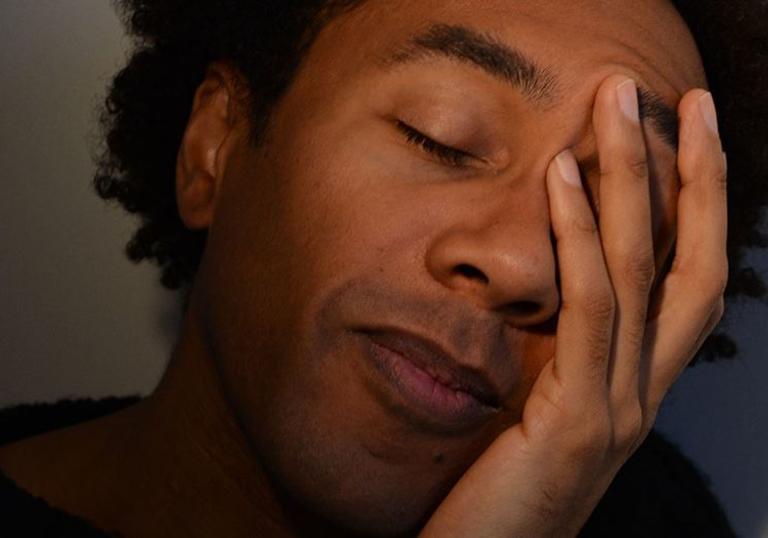We speak to Clayton about his introduction to Eastman’s music and the origins of The Julius Eastman Memorial Dinner.
‘I first discovered Julius Eastman in 2010, back when I was working with the New York City not-for-profit art and technology centre, Eyebeam,’ explains Clayton. ‘I was hosting an educational radio show, Mudd Up!, on independent radio station, WFMU, and searching for a new project. I wanted to do something with piano music and live electronics, to transform someone else’s musical composition, but I was having problems finding something that made sense.’
It was Clayton’s friend, the writer and historian Sharifa Rhodes-Pitts who made the initial discovery. ‘She called me from her friend’s cafe in South Africa,’ says Clayton. ‘She said, ‘Hey if you’re looking for interesting piano music, check this guy out!’ She told me about this New York City black minimalist guy called Julius Eastman. I went and did my research. I was blown away.’ What Clayton discovered was a forgotten man. A former child soprano, ballet dancer and piano prodigy from Ithica, New York. Eastman had been part of early 70s Avant-Garde classical scene, and had performed with Morton Feldman, John Cage and Pauline Oliveros, as well as such Downtown New York artists as Meredith Monk, Robert Wilson and Arthur Russell, but in his final years he had lived rough in Manhattan’s Tompkins Square Park and died alone in 1990 at the age of 49 in Millard Fillmore Hospital in Buffalo New York.
Through a 3CD 1996 collection called Unjust Malaise, Clayton discovered Eastman’s music, a liberating, high-energy form of organic Minimalism, with a sense of anarchy at its heart.
‘The music was perfect,’ says Clayton. ‘Muscular, romantic, epic, but also refined and complicated. It made total sense for the project.’
Clayton was most inspired by two of Eastman’s late 70s long-form pieces for multiple pianos, provocatively entitled ‘Gay Guerrilla’ and ‘Evil Nigger’. The pieces were first reworked by Clayton for a 2013 album entitled The Julius Eastman Memory Depot, in which the hypnotic piano performances are fed into his laptop, creating a third sound world of resonance, dissonance and decay. That record was then developed into the theatrical project, The Julius Eastman Memorial Dinner.
‘Suddenly I felt I could actually do an evening-length project with this man’s life,” says Clayton. ‘What interested me was how Eastman had been written out of music history, and how he played on so many different ideas of identity, – class, race, sexual orientation.’
We had a lot of commonalities; a shared spirit of rupture, trying to constantly upset the thing and keep it productively unstable.
In terms of the theatrical performance, the playing of the pianists David Friend and Emily Manzo, is fixed. It has to be, because of the complexity of Eastman’s arrangements. What changes every evening is how Clayton interprets the music through electronics.‘These pieces are so immersive that the dynamic shifts from one night to the next,’ he says. ‘It has to do with the electronics, but it also has to do with the acoustics in the room, the way the overtones hang in the air differently, from one night from the next. The more I learned about Eastman, the more I felt comfortable taking this approach to his work. We had a lot of commonalities; a shared spirit of rupture, trying to constantly upset the thing and keep it productively unstable.’
In 2013, a piece ponders a parallel world where Eastman’s posthumous fame has reached Andy Warhol proportions seemed like obvious satire. However, in the years since the CD, and especially over the past eighteen months, Eastman’s star has risen considerably.
An anthology of Eastman essays, Gay Guerrilla, was published in December 2015, while in August 2016, a CD of a lost Eastman work, Femenine was released on the Frozen Reeds label. Eastman festivals and programs followed in London, Los Angeles and Philadelphia. It’s a rediscovery on which Clayton remains conflicted. ‘Reverence can be a form of forgetting,’ he says. ‘It’s too late to offer support to this guy and it can easily become this empty hero worship. One problem is that his biography talks over the music. The other problem is context. Classical music venues are worried about audiences getting older. Sudenly, along comes what seems like this quick fix: Julius Eastman; the face of diversity. A black gay guy who’s dead? Damn, put him on all the posters. He’s this stand-in for a push for diversity. He solves all your problems: ‘Here’s this one guy that’s been left out of the canon. We’re going to correct that, then things are fine’.’ However, Clayton thinks Eastman’s music is tough enough to withstand any co-opting by the academy.
‘If it’s all-straight, all-white people performing it’s not quite right. It’s not about quotas, but it’s an opportunity to think about what inclusivity might mean.’
‘It’s funny,’ he says. ‘I think Eastman built that [toughness] into his work, by calling the pieces things like ‘Gay Guerrilla’ or ‘Crazy Nigger’. When staging this music there needs to be some attention to that. If it’s all-straight, all-white people performing it’s not quite right. It’s not about quotas, but it’s an opportunity to think about what inclusivity might mean, what hostility to institutionalisation might mean. It’s partly about keeping him free but it’s also about respecting the complexities of identity that led to this music. If you’re just replaying it straight, you might be missing the point.’

